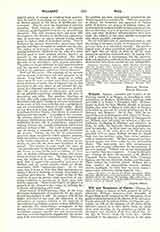

Willaert, ADRIAN, composer and founder of the Venetian school, b. at Bruges, or, according to other authorities, at Roulers, Netherlands, between 1480 and 1490; d. at Venice, December 7, 1562. Willaert, taught in Paris by Jean Moulin, disciple of Josquin Depris, first went to Rome in 1516, then to Ferrara, after which he entered the service of King Louis II of Bohemia and Hungary. On December 12, 1527, he accepted the post of choir master of St. Mark’s at Venice. Although grounded in the principles of contrapuntal art, Willaert soon fell under the influence of the new tendency, developing in Florence and elsewhere in Italy, to make the harmonic element predominate over the melodic. As there were two choir lofts, one on each side of the main altar of St. Mark’s, both provided with an organ, Willaert divided the choral body into two sections, using them either antiphonally or simultaneously. He then composed and performed psalms and other works for two alternating choirs. This innovation met with instantaneous success and strongly influenced the development of the new method. Willaert was no less distinguished as a teacher than as a composer. Among his disciples are: Ciprian de Rore, his successor at St. Mark’s; Costanzo Porta; Francesco della Viola; Giuseppe Zarlino; and the two Gabrielis, Andrea and Giovanni. These formed the Venetian school. Willaert left a large number of compositions—masses, psalms, motets, madrigals, for from four to seven voices—preserved in collections dating from his time.
JOSEPH OTTEN

